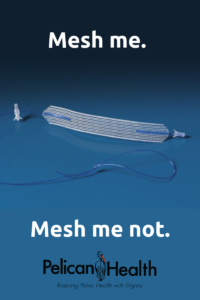 You’ve seen the commercials. ATTENTION! Call now regarding a product liability claim against pelvic mesh. Knowing well that this controversial mesh is their surgical treatment option, women have become fearful of disclosing any bladder complaints to their healthcare team. Instead, they are opting out of bladder conversations and under reporting their episodes of incontinence.
You’ve seen the commercials. ATTENTION! Call now regarding a product liability claim against pelvic mesh. Knowing well that this controversial mesh is their surgical treatment option, women have become fearful of disclosing any bladder complaints to their healthcare team. Instead, they are opting out of bladder conversations and under reporting their episodes of incontinence.
At one time, mesh slings were widely recognized as one of the most significant innovations. Unfortunately, a message that all mesh is bad has been delivered and received. Yes, problems with mesh surgery have evolved and can be related to how it is placed. Yet in the right hands and in the right patient, mesh slings for incontinence continue to be a safe option. In fact, in the United States, mesh surgery for stress urinary incontinence is often thought of as the best surgical option for leaks caused by exertion. For now, mesh slings remain a gold standard.
If you are a woman experiencing incontinence, are you destined for mesh placement?
Absolutely not. There are different types of leaking problems. A visit with a bladder specialist and teaming with the correct surgeon (if needed) will result in better confidence and outcomes. However, there are specifics that women need to know when considering surgery.
It doesn’t have to be mesh. Other surgical options are available.
Slings created from your own tissue are referred to as pubovaginal sling or autologous sling. This type of sling also has great outcomes reported.
Why haven’t you been offered this type of sling?
Interestingly, the utilization of your own tissue is more invasive and has a longer recovery then a mesh sling. However, if a mesh-free alternative is your priority, then a fascial sling might be worth the recovery.
A thin but very tough layer of tissue from your abdomen or thigh muscle is used. It is then placed in position under the urethra through an incision in the vagina and used as a supportive sling. This is not a novel technique; its use precedes the mesh sling but fell out of favor when a quicker alternative was found with mesh slings. The technique is recognized as an invaluable option.
How far do you have to travel to undergo a mesh-free option?
In our region, there are not mesh-free surgeons around every corner. But they do exist. If urine leaking with activity, coughing, and laughing is starting to affect your lifestyle, it’s time to see a bladder specialist at Pelican Health to discuss your preferences and options. Your bladder shouldn’t hold you back from enjoying exercise and hobbies. And fears of surgical options shouldn’t hold you back from seeking help.
American Urological Association (2013). AUA Position Statement on the Use of Vaginal Mesh for the Surgical Treatment of Stress Urinary Incontinence (SUI). https://www.auanet.org/guidelines/use-of-vaginal-mesh-for-the-surgical-treatment-of-stress-urinary-incontinence
National Institute for Health and Care Excellence (2018). Guideline urinary incontinence and pelvic organ prolapse in women: management. Draft for consultation. Retrieved from: https://www.nice.org.uk/guidance/gid-ng10035/documents/draft-guideline
American Urological Association (2017). Surgical treatment of female stress urinary incontinence (SUI): AUA/SUFU guideline. Retrieved from https://www.auanet.org/guidelines/incontinence-stress-urinary-incontinence-(2017)

